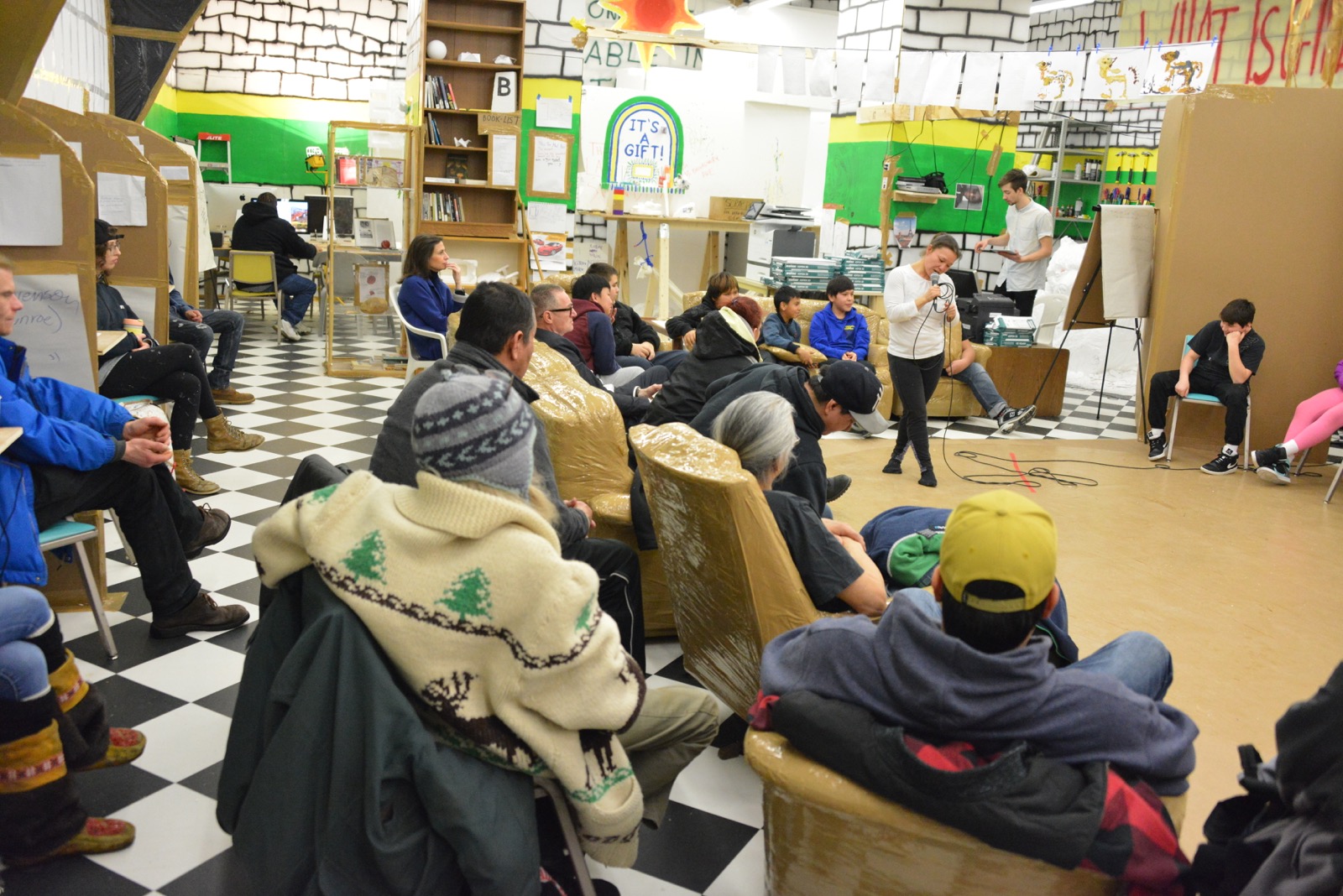Thomas Hirschhorn: What can I learn from you. What can you learn from me. (Critical Workshop).
This is a Critical-Workshop. An everyday workshop, from morning to evening. I want to invite different and diverse residents of Saskatoon to be present and to share their specific knowledge, specific skills or specific histories with the other. I, myself, will take part with my own input. I will be on site from morning to evening, every day.
The idea, the philosophy, the guideline, the affirmation of this workshop is: To share the PARTICULAR and by sharing it, making it UNIVERSAL. Because everybody can learn something from the Other. And because everybody can teach the Other something specific.
“What can I learn from you. What can you learn from me.” is the affirmation that there is something to share, which goes beyond all differences, beyond all particularities. I want to understand learning as sharing. Sharing something with the other is an act of generosity because what is shared allows the Other to learn. What is learned is something I did not expect to learn, I did not need to learn, I did not want to learn. I learned it because somebody made the gesture of sharing it to me. She/he taught me something because her/his competence. She/he didn’t teach me because it was important to me, but because it was important for her or for him. Therefore, it can, also, become important to me. Nothing is of no importance, everything can be important, everything can become important. I want to define the act of sharing—a work, a skill, a thought, an experience—as an act of competence. We/I will share what I/we am/are competent for. We/I must ourselves/myself decide what I am competent of. To be competent means to take responsibility. I want to create the conditions in which to share our competences, all kind of competences we own, as human beings. “What can I learn from you. What can you learn from me.” is the ambition and the attempt to create a universal work of art.
Art is universal. Universality means Equality, Justice, Truth, the Other, the One World. Art—because it’s art—can provoke a dialogue or a direct confrontation, from one to one. Therefore I think that each human being can get in touch with art, each human being can be transformed by the power of art. I believe that art is the way to reinvent the world. Art is autonomous. Autonomy is what gives an artwork its beauty and its absoluteness. Art—because it’s art—can create the conditions of an implication, beyond anything. Art is resistance. Art resists facts; Art resists political, aesthetical, cultural habits. Art is positivity and intensity. Art—because it’s art—calls for equality. There is no other fundament, there is no other mission. The absolute affirmation of Equality is the link, the hidden and invisible connection which holds a work together. Precisely because it’s not a fact, pure Equality needs to be fought for at every moment. Therefore I believe there is something “I can learn from you” and there is something “you can learn from me.”
I believe in art and I have faith in art. I think that art is an inclusive movement and that art should include the ‘Non-exclusive audience’, the Other, the Neighbour, the Stranger, the Unknown, the Un-interested. Art can never act in resentment or negatively; art is always and in all circumstances against discrimination, racism, and exclusion. As an artist, I want to express my belief in equality and my understanding of Equality as a common wealth: a wealth, which we all have in common. Equality—as wealth—is something to achieve and defend, day-by-day, work-by-work, again and again. Achieving and defending equality, as an artist, means making egalitarian works of art and taking an egalitarian artistic position. The competence to do this—my competence—can only come from the work itself, from making it, and asserting it. I consider my competence to give form to a mission. Competence is an important term for me, because the competent one has to prove his or her skill with acts. Competence towards Equality demands asking myself questions and giving responses, in working—in doing a work of art. “What I can learn from you. What you can learn from me.” wants to work this out.
Working, as an artist, means understanding art as a tool, as an instrument or as a weapon. I choose to understand art as a tool to confront reality. I use the ‘tool,’ art, to encounter the world I am living in. I use the ‘tool,’ art, to live within the time I am living in. I use the ‘tool,’ art, because it allows resisting the historical fact beyond the history I am living in—precisely because it allows me to make ahistorical work within the chaos and complexity of the present moment. I want to use art as a tool to establish contact with the Other. I am convinced that the only possible contact with the Other happens “One to One”, as equals. I want to make a work that gives form—a form of Equality—to the affirmation: the Other is included in “me” and in “I.” Édouard Glissant, beautifully and powerfully wrote: “The Other is in me because I am me. Equally—the I from whom the other is absent—perishes.” This is the problematic, the challenge, the mission, and why I love making works of art so much. My ‘Critical Workshop’ “What I can learn from you. What you can learn from me.” is an attempt to give Form.
